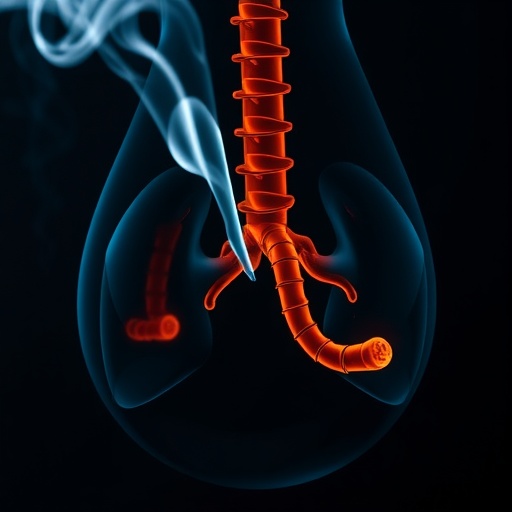In an unprecedented exploration into the unseen early dynamics of cancer development, researchers from IRB Barcelona and the University of Washington have unveiled compelling evidence detailing how biological sex and smoking habits directly shape the mutational landscape and clonal evolution within healthy human bladder tissue. Published on October 8, 2025, in the journal Nature, this groundbreaking study extends our understanding of bladder carcinogenesis by illuminating the subtle molecular and cellular alterations long before malignancy arises, offering tantalizing possibilities for novel cancer prevention and early detection strategies.
Bladder cancer, representing one of the most prevalent malignancies worldwide, shows a stark sex disparity with men being nearly four times more susceptible to developing the disease than women. Coupled with the well-acknowledged risk posed by tobacco smoking, these epidemiological observations have beckoned scientists to decode the biological underpinnings that modulate this heightened vulnerability. Traditional research approaches, predominantly tumor-centric, have fallen short of explaining how these factors influence the initial tumorigenic events. Addressing this gap, the current study meticulously probes healthy bladder tissues to elucidate the earliest genomic alterations and their expansion dynamics.
Under the stewardship of Dr. Núria López-Bigas and Dr. Abel González-Pérez at IRB Barcelona, together with Dr. Rosana Risques at the University of Washington, the international team employed an innovative methodological framework likened by researchers to transitioning from a backyard telescope to the James Webb Space Telescope. This approach significantly enhances mutation detection sensitivity, surpassing the resolution limits of conventional DNA sequencing technologies. By scrutinizing bladder samples from 45 donors, the team quantified thousands of somatic mutations, many of which had remained elusive in prior analyses limited to overt tumors.
A pivotal revelation of the investigation was the distinct mutational evolution patterns associated with sex. Male bladder tissue exhibited a pronounced selection for mutations conferring a proliferative advantage within cancer-associated genes, resulting in dominant clonal expansions even in ostensibly normal epithelium. This phenomenon underscores how intrinsic biological factors can sculpt the somatic mutational architecture, potentially priming the tissue environment towards malignant transformation.
Furthermore, smoking emerged not merely as a mutagenic force but as a potent clonal promoter within bladder tissue. Among donors aged 55 and above with smoking histories, the researchers identified a marked increase in mutations within the TERT promoter region. This element governs telomerase activation, a critical mechanism enabling cells to evade replicative senescence and sustain unchecked division. Intriguingly, tobacco exposure appeared to facilitate the selective expansion of pre-existing mutant clones, amplifying the cellular aberrations that underpin carcinogenesis.
This dual role of tobacco — instigating new mutations and bolstering clonal growth — represents a paradigm shift in how environmental carcinogens are conceptualized, emphasizing their impact not only on mutational burden but also on the evolutionary fitness landscape of somatic cell populations. The direct observation of these phenomena in healthy human bladder tissue rather than advanced cancers provides unprecedented insights into the initial oncogenic triggers.
Beyond mere mutation counting, the study advocates a nuanced perspective focusing on mutation selection and clonal expansion dynamics. This evolutionary lens reveals how some mutations outcompete others within the tissue microenvironment, modulated by both inherent biological sex and extrinsic smoking exposure. Such distinctions are crucial for unraveling the mechanisms driving the disproportionate cancer risk observed in men and smokers.
Looking ahead, the insights gleaned from this research herald transformative potential for clinical oncology. Quantifying clonal expansions in bladder tissue, potentially through non-invasive urine-based assays, could revolutionize cancer risk stratification and early intervention paradigms. The strategic detection of expanding clones harboring detrimental mutations could serve as a sentinel marker for imminent malignancy, enabling preemptive therapeutic measures.
Moreover, this investigative framework possesses broad applicability, extendable to other tissue types and carcinogenic exposures including occupational chemicals and chemotherapeutic treatments. By mapping the tissue-specific mutational and clonal evolution trajectories, researchers can pinpoint high-risk populations and unravel carcinogenic pathways across diverse cancer forms.
Dr. Abel González-Pérez emphasized the study’s pioneering nature, noting that despite analyzing a limited panel of sixteen genes across 45 individuals, significant mutational disparities were discerned. The scalability of this approach, coupled with its unparalleled resolution, promises to deepen our grasp of tissue evolution and carcinogenesis, charting new frontiers for precision oncology.
Critically, this research emerges from the efforts of the PROMINENT team under the Cancer Grand Challenges initiative, a testament to international collaboration and innovation in the fight against cancer. The fusion of computational simulation, advanced genomics, and evolutionary biology has been instrumental in decoding the intricate mutational undercurrents in healthy human bladder tissue.
The study’s findings not only bridge critical knowledge gaps about the initiation of bladder cancer but also invigorate the scientific community’s commitment to preemptive cancer care. By illuminating how sex and smoking bias the selection of somatic mutations, the research opens avenues for refining cancer susceptibility models and tailoring personalized prevention strategies.
Key contributors to this work include PhD candidates Ferriol Calvet and Raquel Blanco from IRB Barcelona’s Biomedical Genomics lab, who spearheaded the study under expert guidance. Their dedicated efforts exemplify the next generation of scientific talent driving innovation in cancer biology.
In conclusion, the pioneering insights from this study significantly advance our understanding of the molecular evolution of bladder tissue under variable biological and environmental influences. By revealing the preferential clonal expansions dictated by sex and smoking, this research lays the groundwork for innovative screening modalities and targeted prevention, ultimately aiming to reduce the global burden of bladder cancer and improve patient outcomes.
Subject of Research: People
Article Title: Sex and smoking bias in the selection of somatic mutations in human bladder
News Publication Date: 8 October 2025
Web References: 10.1038/s41586-025-09521-x
Image Credits: IRB Barcelona
Keywords: Cancer risk, Mutation, Gender, Cancer genetics, Cancer genome sequencing, Cancer patients, Carcinogenesis, Malignant transformation, Oncology, Cancer
Tags: biological sex differences in cancer riskclonal evolution of bladder cellsearly bladder tissue development and cancerearly detection of bladder cancergender disparities in cancer researchIRB Barcelona cancer study findingsmolecular alterations in bladder carcinogenesismutational landscape in healthy bladder tissueprevention strategies for bladder cancersmoking impact on bladder cancertobacco use and cancer susceptibilityunderstanding bladder cancer epidemiology





